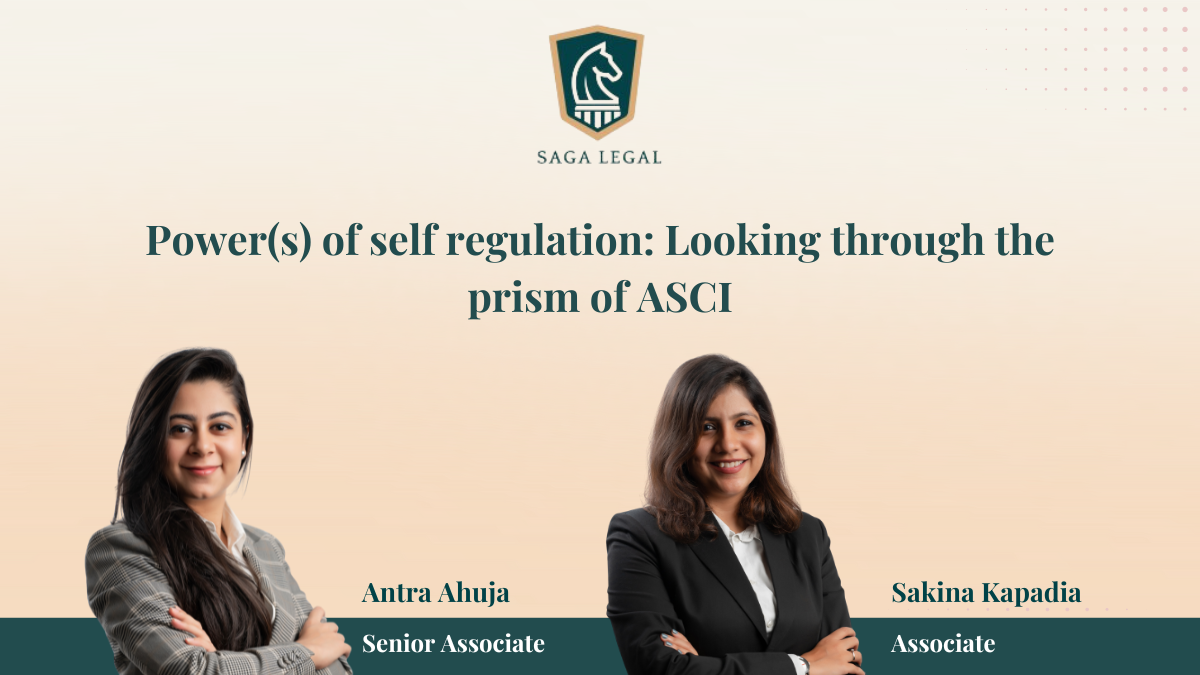
Power(s) of self regulation: Looking through the prism of ASCI
Published on: 26-Mar-24
Read On: Bar & Bench
Self-Regulating Organizations (“SROs”) can find their origin in legislation, draw a mandate from a principal regulator, or be incorporated as not-for-profit that is part of fee-based voluntary organizations. In contrast to the existing SROs for different industries such as insurance, capital markets, FMCG, drugs and medicines, the Advertising Standards Council of India (“ASCI”) was established voluntarily by professionals from the advertising and media industry back in 1985 and is legally registered as a not-for-profit company under the Companies Act, which sets it apart from other SROs in terms of legal structure and monitoring powers.
This article aims to provide: (a) an understanding of the applicability of the Code for self regulation of advertising content in India (“Code”) released by the ASCI and (b) whether the ASCI has any penal powers in case there is a contravention of the Code.
Does the ASCI have any penal powers?
In the case of Procter and Gamble Home Products Private Limited vs. Hindustan Unilever Ltd, the Delhi High Court has discussed the jurisdiction of ASCI. The Court held that the ASCI has been established as a self-regulatory body in the field of advertising and not for dispute resolution or for resolution of claims made by the plaintiff in the suits against the defendant. Although the ASCI has a complaints committee, such a committee is only to “self-regulate." Even if the ASCI finds merit in a complaint, it can only recommend the advertiser to remove the advertisement but has no mechanism to compel removal of the advertisement or to grant any interim relief or to award damages.
In the case of Century Plyboards (India) vs. ASCI, it was emphasized that ASCI cannot assume the powers of a civil court. The machinery of ASCI has been specifically designed to “complement the legal controls” rather than surpass them.
While SROs may have disciplinary measures in place, such as issuing warnings, suspensions, or revoking memberships, these actions are usually internal to the organization and do not carry the force of law. However, in some cases, SROs work in collaboration with regulatory authorities or government agencies to address non-compliance issues, leading to legal penalties or sanctions imposed by the relevant authorities.
Conclusion
With little to no clarity on the issue of whether the Code is applicable to members as well as non-members, companies find themselves grappling with uncertainty. Therefore, it is imperative to delve deeper into these grey areas and delineate them with precision.
In Spain, the Jury of Autocontrol, the Spanish Self-Regulation Organization, obtained public recognition as an Alternative Dispute Resolution (ADR) body. All the decisions of the Advertising Jury are made public, are mandatory for the members of the Autocontrol and are considered voluntary for the rest.
In Italy, the Code of Marketing Communication Self-Regulation 70th edition, effective from June 1, 2023, is binding for advertisers, agencies, advertising and marketing consultants, media of any kind, and for anyone who has accepted the Code directly or by membership of an association, or through an agreement to execute marketing communication as described in the code.
Therefore, we understand that in countries such as Spain and Italy, voluntary bodies can only bind members or affiliated entities. However, decisions by the said bodies are seen to have an undeniable moral force throughout the sector, including among companies that are not members.
Further, SROs typically do not have direct penal powers in the sense of imposing legal sanctions or fines. Instead, their authority lies in establishing and enforcing industry standards, codes of conduct, and regulations within their respective sectors. However, we see that there are countries that give penal powers to SROs. In the case of the Philippines, the earliest Advertising Code of Ethics dates back to the Philippine Board of Advertising (PBA) established in 1974. In 1989, the PBA was renamed AdBoard (Advertising Board of the Philippines) and it was mandated by IRR of RA 7394 or the Consumer Protection Act to ensure that all advertising materials conform to its Code of Ethics. It was further laid down that non-compliance of the same could lead to penalties.
Additionally, and uniquely for a self-regulatory organization in India, the ASCI has been recognised as a self-regulator under the Cable Television Networks (Amendment) Rules, 2021. It is imperative that clarity is provided on whether, after such recognition, ASCI remains a self-regulator or it is a co-regulator with a mandatory code which binds all concerned stakeholders involved in the advertising irrespective of membership or any agreement, with its members having an expressed undertaking to abide by the Code.